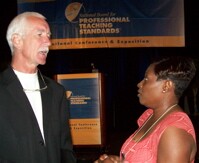Tectonic plates are colliding under the ocean of knowledge and information, and a tsunami is coming that will radically change the face of education as we know it. That was the message that Tom Welch delivered in today’s opening session of the National Board for Professional Teaching Standards 2009 Conference and Exhibition.

Welch (seen here talking to Michelle Johnson) set out to affirm and inspire the National Board Certified Teachers in attendance, and also warned us ahead of time that he intended to challenge us. As someone who likes a challenge, I sat up a bit straighter in my seat when he said that - then tried not to sink back down too far as I heard what the challenge is.
First, the tsunami. The “plates” in question are technology, common standards and assessments, and a movement towards “performance-based credentialing” for students. In other words, if a student has mastered what needs to be mastered in a course before the school year is done, they move up to the next level, and conversely, if a student needs more time than the school year allows, let them continue working towards satisfactory performance rather than letting the calendar close the door on learning.
Borrowing from Jeff Jarvis’s What Would Google Do?, Welch passed along his two key take-away ideas: “the age of the middleman is dead,” and “focus on what you do best, outsource the rest.”
Having outlined how many different ways students can obtain information and interact with the world directly through information technology, Welch then asked, “So, who’s the middleman in education?” There was no need for him to solicit responses, or answer the question the question himself. There was a palpable “uh- oh” kind of reaction among audience members.
But Welch is not suggesting teachers are obsolete. Far from it. The second idea is the key - focus on what you do best. Amid all of the web applications and the personal electronic devices, the ways we work need to change; but teachers are irreplaceable because the core of the work is still there. We still need to know our students and how they learn, create the opportunities for that learning to happen, and monitor the results.
From what I could gather and overhear, those in attendance were receptive to the message and open to the challenge. Our collective “uh-oh” came with a smile. And that’s the way it should be among National Board Certified Teachers: self-assessment and critical reflection are central to our certification. The hard part for me in a situation like this is seeing the gap. We have a long way to go in many schools and classrooms, including mine. The value of Welch’s challenge is that it offers a vision and a frame for thought that can guide the small steps that will take years for me to implement.
Some schools and classrooms may look like they’re further along, but Welch suggested a second look to make sure that our vision of the future is not just an electronic version of the past. Computers and multi-media resources have great potential, but when they just guide children through their text books without capitalizing on more than sound and images, they haven’t really moved very far. Smart boards are tools with great potential, but are we using them simply as digital chalkboards? Are students learning to use them, or are they sitting in quiet rows as passive observers of their teachers’ use of technology?
We need to have our heads up and our vision clear, and stay loose, because when that tsunami rolls in, we’re going to be swimming in some rapidly shifting waters.